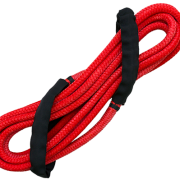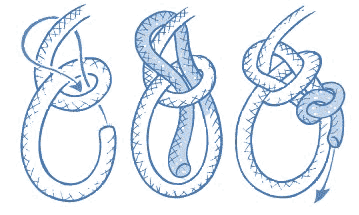Kinetic Energy Recovery Rope Sizing Guide
| Vehicle Type and Size | Diameter | Minimum Break Strengths | Recommended WLL |
|---|---|---|---|
| ATVs, Snowmobiles, Garden Tractors | 1/4″ – 5/16″ | 1,790 – 2,890 lbs | 360 – 560 lbs |
| Cars: compact, full-sized, Minivans | 3/8″ – 1/2″ | 4,080 – 7,060 lbs | 820 – 1,410 lbs |
| Light Trucks, SUVs, Vans | 1/2″ – 5/8″ | 7,060 – 12,920 lbs | 1,410 – 2,580 lbs |
| Trucks, Cube Van, Motorhomes to 26′, Tractors 20-50hp | 5/8″ – 3/4″ | 12,920 – 16,240 lbs | 2,580 – 3,250 lbs |
| Medium Duty Trucks, Motorhomes over 26′, Tractors 50-80hp | 3/4″ – 1″ | 16,240 – 26,350 lbs | 3,250 – 5,270 lbs |
| Trucks, Tractors 80-120hp, Railcar Pullers | 1″ – 1-1/4″ | 26,350 – 44,200 lbs | 5,270 – 8,840 lbs |
| Logging Trucks, Tractors 120-200hp | 1-1/2″ – 2″ | 61,200 – 100,300 lbs | 12,240 – 20,060 lbs |
| Mining Trucks, Tractors 200-400hp | 2″ – 2-1/2″ | 100,300 – 148,750 lbs | 20,060 – 29,750 lbs |
CAUTION
• Avoid all sharp edges.
• Use shackles of an appropriate strength for the rope and consider switching to soft shackles for increased safety.
• Always check the splice before and during attachment to each vehicle
• Test before use. Try light pulls to test attachment before pulling at maximum force
• Keep spectators out of the tow zone
• A Bowline knot is recommended if the rope must be knotted. This will undo most easily after use.
*A knot can reduce a rope’s strength by as much as half.*
This is only a guideline. Use common sense and ALWAYS KEEP SAFETY THE TOP PRIORITY and ensure your application is verified for proper sizing prior to use. Remember knots in a rope or the use of a nylon rope while it is wet will have a negative impact on the rope’s strength. For more information on rope safety, read our Brief Note on Rope Usage & Safety.





